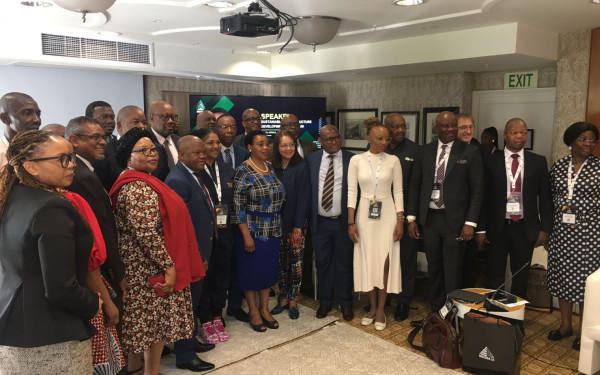South African and regional ministers convened to pinpoint key infrastructure priorities both within South Africa and across the continent during a Leaders Meeting at the Sustainable Infrastructure Development Symposium (SIDSSA) 2024 on March 18 in Cape Town.
The discussion, which was led by South Africa’s Minister of Public Works and Infrastructure Sihle Zikalala, underscored the importance of project preparation, engagement from both the public and private sectors, maintenance and the implementation of sustainable facilitation methods as crucial elements in fostering investment and promoting regional harmonization within the infrastructure sector.
Taking place on March 17-19 at the Century City Conference Center, SIDSSA brings together key stakeholders in South Africa and across the continent with the aim of driving infrastructure development. SIDSSA 2024 serves as a crucial platform for discussions and partnerships in the infrastructure investment landscape, with a focus on accelerating economic activity through strategic infrastructure plans. Energy Capital&Power – the leading investment platform for the African energy sector – is a media partner for this important platform. For more information, visit www.SIDSSA.org.za..
“The purpose of this forum is to identify areas of priority on infrastructure and ensure that we integrate efforts to implement those projects,” Minister Zikalala stated.
The establishment of Infrastructure South Africa aims to serve as a point of entry for infrastructure planning in the country. The organization is a one-stop shop that catalyzes the country’s infrastructure target set out in South Africa’s National Development Plan, providing best practices in project preparation, planning and technical and financial support for projects.
“We have been established as a bespoke infrastructure development agency in the country,” stated Infrastructure South Africa Head Mameetse Masemola, adding, “We deal with matters around private sector-led infrastructure projects, which require authorizations, permits, licenses and normal bureaucracy around getting projects to be implemented. We unlock these restrictions.”
Meanwhile, it was noted that cross-border collaboration between countries in Africa is a requisite to creating the conditions conducive for the private sector to participate in the continent’s infrastructure development. A number of MoUs between South Africa and its neighboring countries – including Lesotho, Eswatini and Zimbabwe – have served to promote regional integration in the infrastructure sector.
“Our main role for the continent is to ensure that we invest in critical infrastructure so that we put in the building blocks that ensure that our nations prosper and that we grow together,” stated South Africa’s Minister of Tourism Patricia de Lille.
A number of efforts introduced by South Africa’s Department of Transport have worked to facilitate the ease of movement from the country’s ports and air space. By liberalizing the continent’s air space and maritime territories, Africa will be able to harmonize the implementation of favorable regulatory frameworks that promote integration.
“We have introduced a number of efforts in trying to bring about this harmonization between our countries,” stated South Africa’s Minister of Transport Sindisiwe Chikunga, adding, “For instance, in South Africa, we have introduced Cross Easy, which ensures that when a truck arrives at a port, it is already processed and reduces its travel time.”
The participation of the Premiers of the Free State and KwaZulu-Natal provinces showcased how South Africa can further integrate the country’s infrastructure systems. It was noted during the discussion that South Africa’s economy relies on the efficiencies of its ports, rail network and aviation network and that it is imperative for the rest of the continent to benefit from the modernization of the country’s infrastructure industry.
“We share borders with countries such as Mozambique, Eswatini, Lesotho, amongst others, and this puts us in a strategic position in terms of ensuring our infrastructure planning and the integration of our infrastructure maximizes the potential of the African continent in terms of moving goods,” stated KwaZulu-Natal Premier Nomusa Dube-Ncube.
International ministers from Liberia, Eswatini, Lesotho, Zimbabwe, Seychelles and Equatorial Guinea also participated in the Leaders Meeting, making a case for investment in their respective countries’ infrastructure space.
“We have come to share with you, to learn with you and to communicate with you. We find that rapid technological advancement is significant and cannot be overstated,” stated Liberia’s Minister of Ports and Telecommunications Sekou M. Kromah, adding, “As we experience the competitiveness of the digital age, it is imperative that our digital infrastructure is able to meet the demands of an ever-changing landscape.”
“The heads of infrastructure departments must always gather to discuss and help other countries that haven’t been developed yet,” concluded Equatorial Guinea’s Minister of Public Works, Housing and Town Planning, Don Pascual Ondo Nze Oyana.
SIDSSA 2024 is organized by the Investment and Infrastructure Office under the Presidency, in collaboration with the Association of African Exhibition Organizers. The National African Federation for the Building Industry joins as an association partner, while the Development Bank of Southern Africa is the official sponsor of the event.
Distributed by APO Group on behalf of Energy Capital&Power.
